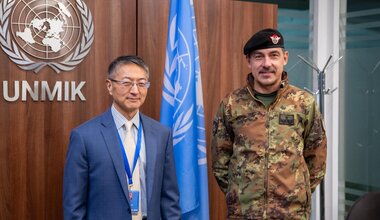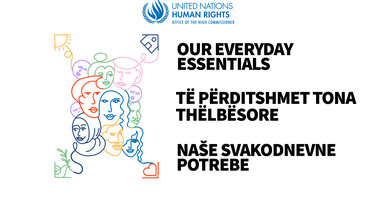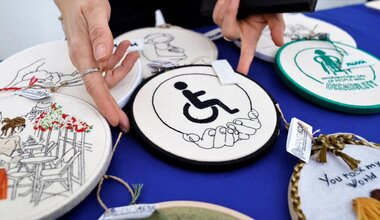25 Oct
2011
States seek agreement and action on top global issues at UN's General Assembly week
With countries looking to the UN to help tackle issues ranging from Middle East peace to climate change and health, 113 Heads of State and Government and nearly 70 foreign ministers traveled to New York to take part in the main General Assembly meeting of the year. Many of the leaders were also involved in a constellation of high-level discussions, taking place on the sidelines of the main event, which drew real commitments and set international consensus in new or difficult arenas.
Secretary-General Ban Ki-moon advised leaders gathered in the Assembly of five “generational opportunities to shape the world,” including prevention (of conflicts, of human rights violations, of runaway damage from natural disasters); a safer and more secure world; supporting nations in transition to new political or economic orders; and working with – and for – women and young people.
The fifth and overarching priority, — indeed, “the imperative of the 21st century” — is sustainable development. By his definition, this means “saving our planet, lifting people out of poverty, advancing economic growth”.
Ahead of a global conference on this imperative in Rio de Janeiro in June 2012, Governments at the UN’s high-level week (19-24 September) had the chance to air positions and seek common ground.
The significance attached to preparations for “Rio + 20” (the United Nations Conference on Sustainable Development) was evidenced by the nearly universal mention of sustainable development by speakers in the plenary, and the voicing of specific concerns or new commitments in this area by more than 100 of them.
Side events adding to the interchange included:
· a General Assembly high-level meeting, “Addressing desertification, land degradation and drought”, attended by more than 100 Heads of State and Government (20 September);
· the penultimate session of the Secretary-General’s blue-ribbon High-Level Panel on Global Sustainability before release of its report early next year (18–19 September);
· the first meeting of a High-Level Panel Action Group on its Sustainable Energy for All Initiative (19–20 September);
· a private sector forum, chaired by the Secretary-General and organized by his Global Compact with business, at which 300 companies endorsed an energy-for-all charter (20 September);
· a meeting on the Yasuni-ITT initiative, which raised $53 million to help forestall drilling in the Ishpingo Tambococha Tiputini (or ITT) oil field in a biodiversity-rich Ecuadorian rain forest (23 September).
Even as the sustainable development agenda was unfolding, the eyes of the world focused on the 23 September application by Palestinian Authority President Mahmoud Abbas for Palestine to become a UN Member State. The ramifications of the application raised the stakes for the meeting the same week of the Quartet (the UN, the United States, the European Union and Russia), which acted to promote the resumption of direct Israeli-Palestinian negotiations, irrespective of the outcome of Palestine’s membership bid.
Another pivotal meeting was held on Libya, hosted by the Secretary-General on 20 September. Of over 50 Heads of State or Government who attended, including President Barack Obama of the UN Host Country, approximately 30 spoke. As important was the presence in strength of the delegation from the Libyan Transitional National Council.
The meeting garnered support for the transitional plan for a new Libyan government, including political, electoral, rule of law, gender equity, inclusiveness and economic recovery aspects. Participants welcomed Security Council resolution 2009 (2011), approving a United Nations Support Mission in Libya (UNSMIL) and modifying the arms embargo, assets freeze and no-fly zone that had been implemented earlier this year. A Friends of Libya group - to be co-chaired by the interim Libyan authorities and the United Nations - will meet periodically in Tripoli to support stabilization and re-construction.
The Secretary-General’s call for enhanced prevention measures was taken up by a 22 September Security Council meeting on preventive diplomacy. Chaired by President Michel Sleiman of Lebanon, the Council encouraged the Secretary-General to fully use mediation and all related tools at his disposal, and underlined the advantages of defusing conflicts in-the-making before they start.
Health
This year’s focus on health issues was the first-ever for the General Assembly, apart from special sessions on AIDS. A 19-20 September high-level meeting on non-communicable diseases sought to address a health challenge of epidemic proportions — principally from cardiovascular and chronic respiratory diseases, cancer and diabetes — and its significant socio-economic impacts, especially in developing countries. Member States adopted a political declaration on prevention and control of these diseases with monitoring duties assigned to the World Health Organization (WHO).
A 20 September event on the Secretary-General’s Every Woman Every Child initiative obtained a $500 million commitment by the healthcare giant, Merck, to reduce child mortality, and a plan by Bangladesh Prime Minister Sheikh Hasina to double the percentage of births attended by skilled health workers in her country by 2015. Over 200 commitments overall, including donations from 50 low- and middle-income countries, added to the $40 billion already pledged at a corresponding General Assembly event last September.
Many Governments agreed to integrate priorities for women’s and children’s health into national strategies, and WHO Director-General Margaret Chan announced the formation of an independent Expert Review Group to help. A meeting earlier in the day, with the Secretary-General, Tanzanian President Jakaya Mrisho Kikwete and US Secretary of State Hillary Rodham Clinton in attendance, focused on Scaling Up Nutrition for mothers and infants during the crucial first 1,000 days, beginning with pregnancy.
Security and safety
A ministerial-level meeting kicked off the establishment of a new UN centre on counter-terrorism, putting teeth into the UN strategy inaugurated in 2006. The 19 September symposium, the first high-level discussion on counter-terrorism since 2006, saw growing acceptance of the UN’s “de-radicalization” approach, which stresses removing motivations for terrorism in addition to military and security measures.
Terrorist agents pose a threat to security of nuclear facilities, as do technical breakdowns and natural disasters. With the Fukushima catastrophe fresh in everyone’s memory, a High-Level Meeting on Nuclear Safety and Security on 22 September took into account all these factors, and the need to restore public confidence in the functioning of such facilities. Discussions centred on the need for openness, stronger standards, international coordination and linkages with the humanitarian agencies that will be called on in the event of emergency.
The Horn of Africa
Concluding the high-level week at the UN on Saturday, 24 September, President Omar Guellah of Djibouti, Prime Minister Raila Odinga of Kenya, Prime Minister Abdiweli Mohamed Ali of Somalia, and Ethiopian Deputy Prime Minister Hailemariam Desalegn reviewed campaigns to protect populations — including refugees streaming across their borders — from the worst regional drought in 60 years. Strong national actions and international support have so far averted a repeat of the region-wide catastrophe of the mid-1980s. But the next round of harvests is not yet in, and the larger challenge of sustainable development solutions remains, they indicated.
The Horn of Africa mini-summit garnered $180 million in contributions, and a World Bank $1.88 billion long-term, no-interest loan from its International Development Association, geared to rapid response, economic recovery and drought resilience.
Given that the only instances of full-fledged famine in the Horn are limited at this time to areas outside the control of national government and largely out of the reach of international agencies, the 23 September Somalia mini-summit took on added import.
Noting that recent political and security developments open the opportunity for further peace and reconciliation, participants welcomed the adoption by Somali leaders of a roadmap for concluding the national transitional period by August 2012. They urged as a matter of priority the rapid deployment of the remaining 2,500 troops for the African Union Mission in Somalia, AMISOM, to reach its authorized level of 12,000.
 UN
UN United Nations Peacekeeping
United Nations Peacekeeping





